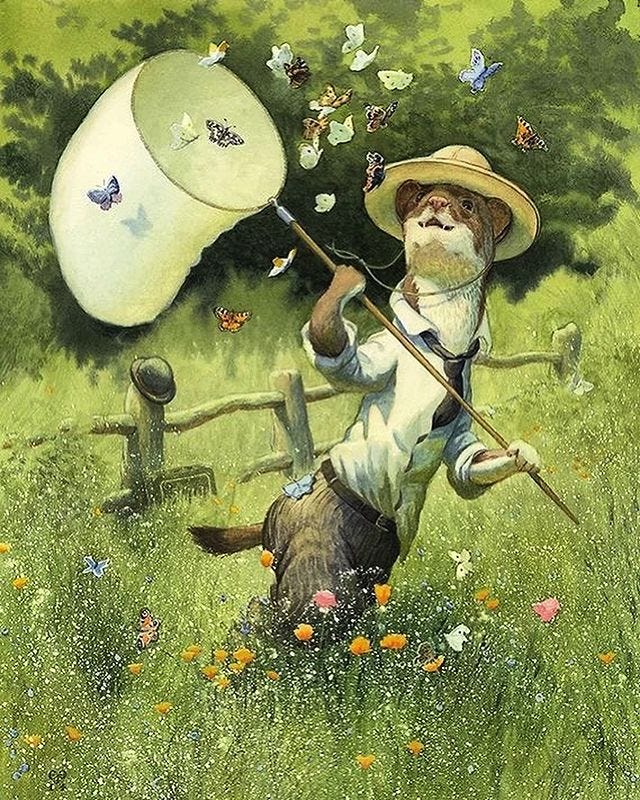Political awareness WITH humility helps us build reciprocal relationships
9 lessons learned on how to connect with people by abolishing our political egos
There is a lot you & I don’t know which means there is so much to learn from others— including people who do not use the same political language as us. People who are different than us can & will transform us… IF we are open to it. This humility and openness is something I believe that is sorely lacking in the so-called left.
I’m not exceptionalizing myself. Early on in my political awareness journey, being around other organizers who fixated on political theory and put specific historical figures up on pedestals, I thought we had it all figured out while others didn’t. I thought we, the “vanguard”, knew THE way and that there was no other way. Even though we claimed to care most about community building and collective liberation, this type of self-righteous thinking also drove me into isolation and hypervigilance. It made it harder for me to connect with people, even those who I could have grown with. I’ve written before about leftist politics often becoming a barrier to connection (good background for today’s piece if you haven’t read it yet):
Focusing on what we're FOR, more than what we're against helps us build relationships
Over the years- thru my own political journey and by working with folks 1 on 1 or in political organizing spaces, I’ve observed how “leftist” politics can further drive isolation & loneliness rather than facilitate meaningful relationship building. If our politics are about struggling for collective liberation, why is it so hard to find a collective we …
The only way we can be free is together but I’ve seen how leftist politics can often prevent us from meeting new people and learning new things that may be liberating. Glancing back at myself a decade ago, I prevented myself from co-creating many relationships because off the bat, I was fixated on assessing, judging and evaluating our political compatibility. I was driven more by my fear & rage against systems rather than love & care for our communities. I desperately needed hope which ironically only came with me surrendering humbly to all the things I don’t know and giving people the best shot they can possibly have at teaching me yet another beautiful aspect of our world that is worth fighting & living for.
So today, I want to focus on ~ humility ~, why “the left” needs a hefty dose of it and tangible lessons learned on how humility can aid us in building life-sustaining bonds.
A story… of how my political superiority complex prevented my growth
About a decade ago, a young student organizer with the right intentions, I still hadn’t thoroughly questioned how colonial/ capitalist systems shaped me. I was surrounded by intense, goal-oriented, militant, intellectuals who undoubtedly taught me a lot about organizing strategy, political history and academic activism but I also had dear friends who focused more on the cultural aspects of resistance- art, dance, embroidery, music, food, language, poetry and traditional medicine.
Subconsciously, I was enamored and mesmerized by the “intellectuals” but relatively unimpressed by those that had dedicated their lives to weaving the cultural fabric of resilient communities. I recall sometimes looking down on my friends that didn’t focus on academics, political theory or mobilize behind major centralized initiatives deemed as “strong, radical organizing”. I was unaware of how colonial power dynamics had seeped into western organizing spaces which led to the deprioritizing of care, intimacy, culture and relationship building. I’ve written before about how this approach often leads to excessive burnout in our movements:
De-prioritizing caregiving, intimacy and relationships drives burnout & despair
These are some big realizations that have come after years of me & folks in my life trying to figure out what we NEED to make life WORTH living. What are the things that will make us want to wake up every morning? What will make us WANT to be ALIVE instead of just “get by” each day? What will make us WANT to move thru the pain or grief just so we could …
I used to fixate on “getting things done” and understanding movements through a hyper-intellectual (frankly elitist) lens with historical & political analysis while dismissing the value of ‘soft’ community care work. I only saw art, music, food, or traditional medicine as a means to a greater end— tools that could further more important organizing goals.
One day after an exhausting protest that left me triggered & enraged, I was eating a meal cooked by a friend who cared deeply about tracing & archiving ancestral Indigenous family recipes, with another friend who was passionate about using calligraphy as a tool to revive Arabic literacy in diasporic communities and another friend who dedicated their life to mastering classical South Asian musical instruments (the Sitar & Veena). I was complaining about how our community members were not doing enough to pushback on oppressive systems, even implying that my friends should have shown up to more organizing meetings, workshops, teach-ins & signed up to take on more work. One of them stopped me and asked “When was the last time you cared just as much to learn about what we dedicate our lives to? Cooking, music, art, tailoring, farming, medicine making… are all these things not radical enough to you?”
The uncomfortable conversation that ensued thrust a mirror in my face and showed me how little I knew about how to CARE for the day-to-day health, wellbeing & happiness of our communities. I was so focused on fighting systems that I overlooked & neglected something as basic, critical & life-sustaining as food, medicine and culture as a whole. I thought these things were accessories to our movements while the political thinkers, the do-ers, leaders, and so-called mobilizers were doing the “real work”. While I don’t regret garnering the experience that I did, I wish I had the humility back then to listen, learn & build deeper relationships with regular folks- the healers, artists, teachers, cooks, tailors & community caregivers. Fast forward to today, as an organizer, my work has shifted dramatically to focus on community care. The irony. So many people- from elders to our youth, were already doing it back then. It was right in front of me & I was too distracted by my political superiority complex.
Some quick housekeeping before we continue…
Thank you to the folks that support this work. I appreciate you endlessly. If you aren’t yet & are able to, you can upgrade to be a paid subscriber with these quick steps.
I work with folks in 1 on 1 sessions (couples, groups, collectives also). I do offer sliding scale options so if you need financial assistance or have any questions about the process, just email me at ayeshakhan0993@gmail.com
When the political left sometimes begins to resemble a fundamentalist religious institution or cult
It helps to take a big step back and look critically at the state of the left, particularly in the west. The longer I familiarize myself with so-called leftist niches, from social media’s echo chambers to movement spaces, the more frustrated I become at how judgmental, condescending, exclusionary and outright fundamentalist they can be. Again, this isn’t a call out, it is very much a call in. Despite our best intentions, when we’re not critical of our bs, we have a tendency to perpetuate the very structures we’re working to dismantle.
Often, I find it hard to differentiate the political left from fundamentalist religious institutions that seek to preach, convince, sway, recruit, and convert people with the moral justification that this is what needs to be done to “save” them from themselves & the larger forces at play. The Bible here may be a political theory reading list that the converts must adhere to for salvation. The prophets or idols are political leaders who are glorified as infallible god-like authority figures, thrust onto pedestals and prayed to without question. Looking past the political jargon, people’s actions sometimes don’t embody kindness, generosity and collectivism. If anything, they reek of self-righteous arrogance and a moral or intellectual superiority complex. The baseline assumption is that people who do not think, speak or act like you cannot possibly know anything useful, let alone have answers to the problems we’re collectively facing. This arrogance is not “revolutionary”, it is shaped by individualism and colonial values of competition, a desire to conquer, dominate, or be better than others.
At the end of the day, I have to ask myself— Do I want to be the smartest, most radical person in the room or do I want to connect with someone? Do I want to be right, correct, better than or do I want to be understood, held & supported? Do I want to pretend like I know everything or do I want to let the potential magic of learning something new everyday sweep over me? Do I want to pat myself on the back or do I want genuine validation that comes from being in reciprocal, messy relationships?
The biggest lesson I’ve learned in the last few years is that people don’t have to talk or think exactly like me to embody collectivist values of liberation. Many people who would not self-identify as a leftist, anti-capitalist, abolitionist, anarchist or what have you still have a lot to teach me and already embody & act on values that I’m still stuck intellectualizing. Many people are DOING the thing in their daily lives— saying “f**k you” to capitalism and the empires crushing their backs, caring for their communities, rooting into culture & their ecosystems. Many regular, average people among the so-called “masses” are more focused on doing, living and building rather than critiquing, theorizing or endlessly intellectualizing. This is a good thing. It is a damn relief!!! I don’t have to know it all because if I’m open to it— even a plant or microbe will teach me about how we should be rooting into and caring for the land & our fellow kin.
9 lessons I’ve learned on how to meet or co-create relationships with people (by trying not to be a self-righteous a**hole)
+ the last section is a bullet point list of some self-reflection questions (that have helped me cling to hope rather than despair and keep my ego in check as I look for and build reciprocal relationships)
PS: I say I’m “trying” to not be an a**hole intentionally because this is a lifelong process.
It is deeply lonely to think that we are exceptional— in our political awareness, knowledge, morality, oppression or suffering. I can’t be the only one & neither can you, even if at times we FEEL lonely.
This isn’t meant to be invalidating. Knowing that this is a collective struggle actually makes me feel LESS ALONE. The person who thinks they are better than everyone else is lonely and so is the person who thinks they are worse off than everyone else. Both these narratives prevent us from healing in community, learning from others, and seeking collective solutions to our distress. If we’re positioning ourselves as above or below someone in any way, we’re missing the chance to build relationships with people who are in reality right next to us.
It can be a self-fulfilling prophecy. If we think that most people will not understand us or that they cannot be our collaborators in joy & liberation, then we’re not going to practice seeking out such connection. No matter how politically aware we think we are, without humility & hope- what difference does it make?
2 tangible examples of how exceptionalism can impede our growth and how humility can guide hope & transformation:
Keep reading with a 7-day free trial
Subscribe to Cosmic Anarchy to keep reading this post and get 7 days of free access to the full post archives.








